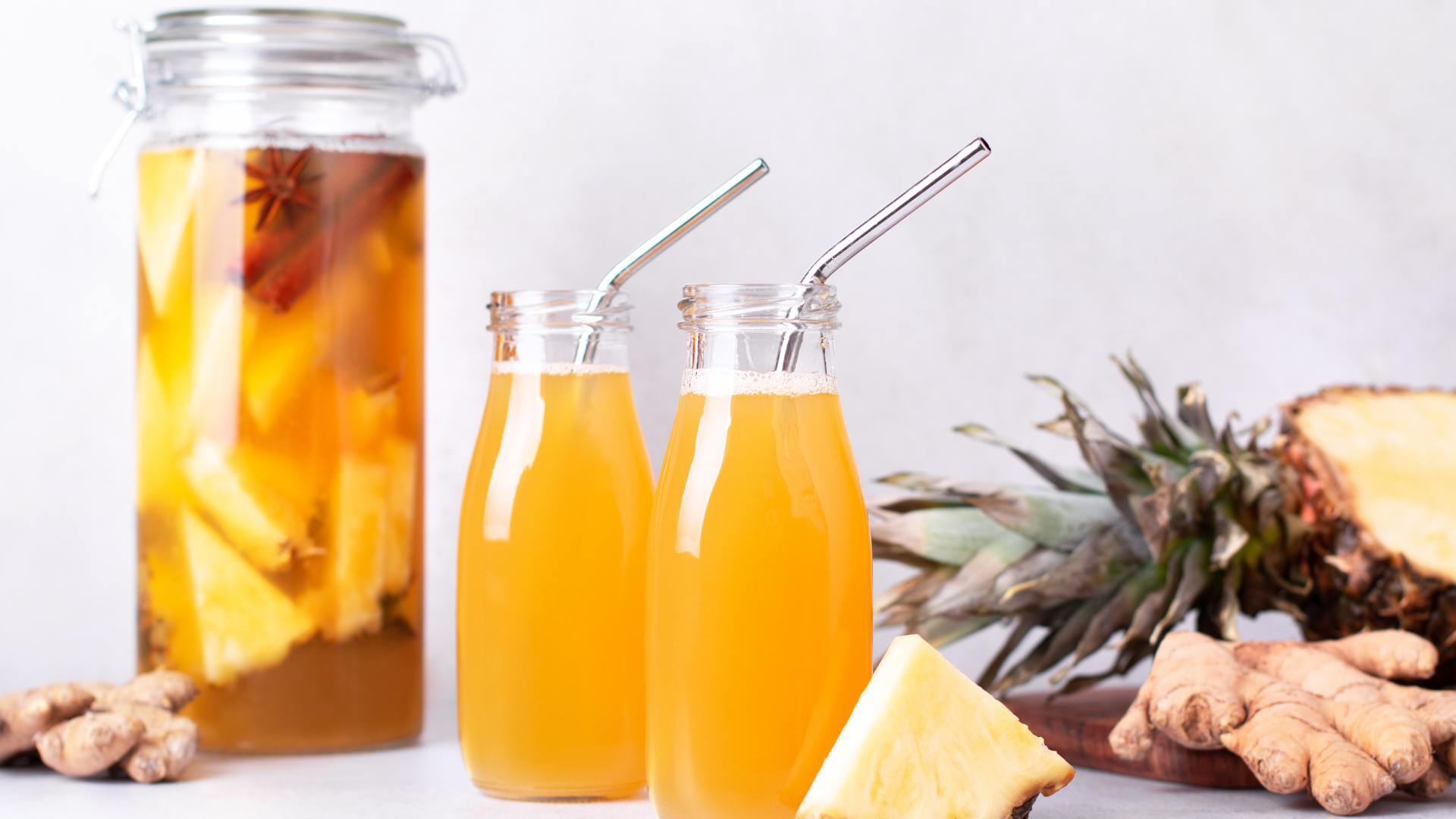Kombucha is a fermented tea made with black or green tea, sugar, and a “tea fungus” called kombucha. The kombucha is added to the tea and sugar mixture, where it grows and ferments for about 10 days. During this time, the beverage becomes carbonated and slightly alcoholic.
The health benefits associated with drinking kombucha are varied, but they generally include improving digestion and immunity as well as providing antioxidants to your body. Kombucha has been known to have many health benefits, including aiding digestion, boosting the immune system, and even reducing stress levels. Kombucha can be flavored with different herbs or fruits to create unique blends that taste great like Ginger Kombucha, Apple Cinnamon Kombucha, Sweet Potato Pie Kombucha and more.
Health Benefits of Drinking Kombucha
The health benefits of drinking kombucha are numerous and varied. A few of the most notable include:
- Helps digestion
The natural acids found in Kombucha can help support your gut health, which is super important if you’re looking to get the most out of your kombucha drinking experience.
- Boosts immune system
The probiotics that are found in kombucha can help boost your immune system, so you’ll be able to take on whatever life throws at you with ease!
- Has anti-aging properties
Because kombucha contains antioxidants, it has been shown to help fight off free radicals that cause premature aging and wrinkles!
- Helps reduce inflammation
Inflammation is caused by a variety of issues ranging from poor diet to stress, but kombucha contains anti-inflammatory compounds that can help relieve this condition and keep your body running smoothly.
Kombucha Recipes:
Kombucha recipes come in all shapes and sizes. While you can make kombucha with just a few ingredients, the options are endless when it comes to making your own Kombucha recipe
Here are some of our favorite kombucha recipes:
–Apple Pie Kombucha: Making apple pie kombucha is a great way to celebrate the fall season. The recipe is simple and only requires three ingredients: apple cider, ginger, and kombucha.
- Pour one gallon of apple cider into a large pot and bring to a boil.
- Add two tablespoons of chopped ginger root to the boiling cider and let simmer for about five minutes.
- Remove from heat and add 1/2 cup of pre-made kombucha or a SCOBY (symbiotic culture of bacteria and yeast) to the pot with the cider mixture and ginger root; let sit at room temperature until cooled completely (about two hours).
- Transfer to a glass container with an airlock lid; store in a dark place at room temperature for 30 days before enjoying!
-Blueberry Ginger Kombucha:
- Add the dried blueberries to a food processor and process until they are broken into small pieces, about 30 seconds.
- Add the ginger, kombucha, and sugar to a large saucepan. Bring to a boil over medium heat, stirring constantly, then reduce heat to medium low and simmer for 15 minutes.
- Remove from heat and let cool for 10 minutes. Strain through a fine-mesh strainer into another bowl or pitcher; discard solids in strainer (or save them for another use).
- Transfer kombucha mixture back into original saucepan; add 1/3 cup of starter tea (from your Kombucha Starter Kit), cover with lid, and let sit at room temperature overnight (about 12–16 hours).
Downsides of Kombucha
Kombucha is a great drink to have on hand, but it’s not without its downsides. You can get a lot of benefits from kombucha, but there are also some drawbacks you should be aware of. Here are some of the main ones:
Too Much Sugar?
Kombucha is made with sugar, so it’s not hard to see why there’s concern about its sugar content. One cup of kombucha has about the same amount of sugar as a soda does. If you’re drinking it every day, this can add up fast!
Does kombucha have caffeine?
You might assume that because kombucha is fermented tea, it would be caffeine-free. But fermented tea actually contains more caffeine than unfermented tea does! Drinking too much kombucha could cause you to feel jittery and anxious if your body isn’t used to having so much caffeine at once. And while the alcohol content in kombucha isn’t enough to get you drunk (it’s usually less than 0.5%), some people do experience an effect similar to what happens when they drink alcohol (e.g., feeling relaxed or sleepy). To get complete information, visit Kombucha Kamp now!







































